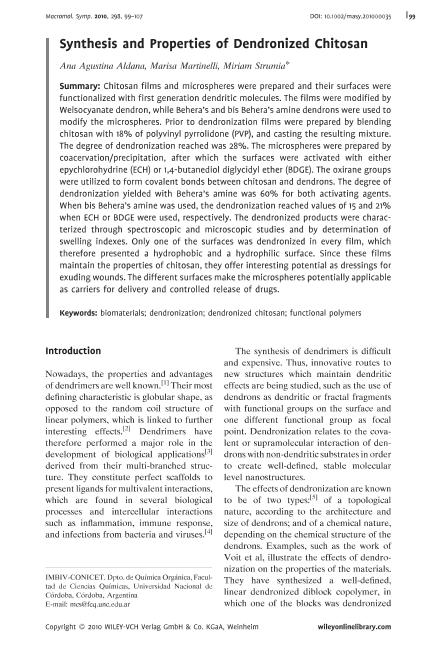Mostrar el registro sencillo del ítem
dc.contributor.author
Aldana, Ana Agustina

dc.contributor.author
Martinelli, Marisa

dc.contributor.author
Strumia, Miriam Cristina

dc.date.available
2017-04-03T19:55:46Z
dc.date.issued
2010-12
dc.identifier.citation
Aldana, Ana Agustina; Martinelli, Marisa; Strumia, Miriam Cristina; Synthesis and Properties of Dendronized Chitosan; Wiley; Macromolecular Symposia; 298; 1; 12-2010; 99-107
dc.identifier.issn
1022-1360
dc.identifier.uri
http://hdl.handle.net/11336/14731
dc.description.abstract
Chitosan films and microspheres were prepared and their surfaces were
functionalized with first generation dendritic molecules. The films were modified by
Weisocyanate dendron, while Behera?s and bis Behera?s amine dendrons were used to
modify the microspheres. Prior to dendronization films were prepared by blending
chitosan with 18% of polyvinyl pyrrolidone (PVP), and casting the resulting mixture.
The degree of dendronization reached was 28%. The microspheres were prepared by
coacervation/precipitation, after which the surfaces were activated with either
epychlorohydrine (ECH) or 1,4-butanediol diglycidyl ether (BDGE). The oxirane groups
were utilized to form covalent bonds between chitosan and dendrons. The degree of
dendronization yielded with Behera?s amine was 60% for both activating agents.
When bis Behera?s amine was used, the dendronization reached values of 15 and 21%
when ECH or BDGE were used, respectively. The dendronized products were characterized
through spectroscopic and microscopic studies and by determination of
swelling indexes. Only one of the surfaces was dendronized in every film, which
therefore presented a hydrophobic and a hydrophilic surface. Since these films
maintain the properties of chitosan, they offer interesting potential as dressings for
exuding wounds. The different surfaces make the microspheres potentially applicable
as carriers for delivery and controlled release of drugs.
dc.format
application/pdf
dc.language.iso
eng
dc.publisher
Wiley

dc.rights
info:eu-repo/semantics/openAccess
dc.rights.uri
https://creativecommons.org/licenses/by-nc-sa/2.5/ar/
dc.subject
Biomaterials
dc.subject
Dendronization
dc.subject
Dendronized Chitosan
dc.subject
Functional Polymers
dc.subject.classification
Química Orgánica

dc.subject.classification
Ciencias Químicas

dc.subject.classification
CIENCIAS NATURALES Y EXACTAS

dc.title
Synthesis and Properties of Dendronized Chitosan
dc.type
info:eu-repo/semantics/article
dc.type
info:ar-repo/semantics/artículo
dc.type
info:eu-repo/semantics/publishedVersion
dc.date.updated
2017-03-30T18:23:53Z
dc.identifier.eissn
1521-3900
dc.journal.volume
298
dc.journal.number
1
dc.journal.pagination
99-107
dc.journal.pais
Estados Unidos

dc.journal.ciudad
Hoboken
dc.description.fil
Fil: Aldana, Ana Agustina. Universidad Nacional de Córdoba. Facultad de Ciencias Químicas. Departamento de Química Orgánica; Argentina. Consejo Nacional de Investigaciones Científicas y Técnicas. Centro Científico Tecnológico Córdoba. Instituto Multidisciplinario de Biología Vegetal (p); Argentina; Argentina
dc.description.fil
Fil: Martinelli, Marisa. Universidad Nacional de Córdoba. Facultad de Ciencias Químicas. Departamento de Química Orgánica; Argentina. Consejo Nacional de Investigaciones Científicas y Técnicas. Centro Científico Tecnológico Córdoba. Instituto Multidisciplinario de Biología Vegetal (p); Argentina; Argentina
dc.description.fil
Fil: Strumia, Miriam Cristina. Universidad Nacional de Córdoba. Facultad de Ciencias Químicas. Departamento de Química Orgánica; Argentina. Consejo Nacional de Investigaciones Científicas y Técnicas. Centro Científico Tecnológico Córdoba. Instituto Multidisciplinario de Biología Vegetal (p); Argentina; Argentina
dc.journal.title
Macromolecular Symposia

dc.relation.alternativeid
info:eu-repo/semantics/altIdentifier/url/http://onlinelibrary.wiley.com/doi/10.1002/masy.201000035/abstract
dc.relation.alternativeid
info:eu-repo/semantics/altIdentifier/doi/http://dx.doi.org/10.1002/masy.201000035
Archivos asociados
